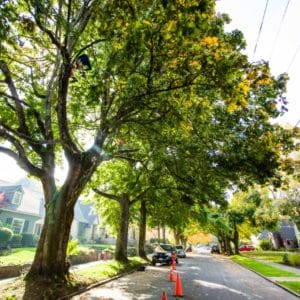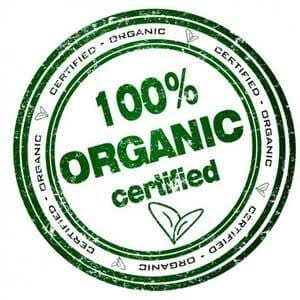Does Organic Pest Control Tree Spraying Work?
 Organic Control methods for tree pests and diseases in many cases work as well as or better than traditional treatments. They are often also more affordable. The leading tree experts at Urban Forest Pro utilize organic tree spraying treatments as a first step and only move to more traditional chemical treatments when the organic treatments fail, the pest or disease is too pervasive for organic treatments to work, or organic treatments have proven ineffective in past experience. Urban Forest Pro only uses organic tree sprays, as the environmental cost of spraying chemicals into the environment always outweighs the benefit. We have found that for the pests common to our area organic sprays perform better.
Organic Control methods for tree pests and diseases in many cases work as well as or better than traditional treatments. They are often also more affordable. The leading tree experts at Urban Forest Pro utilize organic tree spraying treatments as a first step and only move to more traditional chemical treatments when the organic treatments fail, the pest or disease is too pervasive for organic treatments to work, or organic treatments have proven ineffective in past experience. Urban Forest Pro only uses organic tree sprays, as the environmental cost of spraying chemicals into the environment always outweighs the benefit. We have found that for the pests common to our area organic sprays perform better.
When you are looking for the leading skilled tree spraying experts near you to treat a tree for disease, it is important to use an arborist with experience in doing so. This is because even if the arborist can correctly identify the disease/pest, there are a multitude of products out there, all at various price points designed to handle natural pest control. It is only through experience with these products that an arborist will know what works on that tree in this climate. Urban Forest Pro has several arborists and consultants with many years of experience diagnosing and treating tree diseases and pests in the Pacific Northwest through precision spraying services.
Contact us today for a free estimate!
Pros and Cons of Organic Pest Control
What's better for pest control - organic or not organic?
Sometimes when you are looking for tree spraying services near you, you want to go "au natural" when controlling pests in your garden or yard, and only an organic product will do. However, sometimes non-organic products are best—and not necessarily unfriendly to the environment.
For example, some non-organic bark sprays are better at permeating the tree (not the air around it), which is an eco-friendly  approach without being technically organic. Foliar sprays might come with an organic label, but when they’re being released into the air, suddenly they’re not as green as you’d like.
approach without being technically organic. Foliar sprays might come with an organic label, but when they’re being released into the air, suddenly they’re not as green as you’d like.
So, organic or not organic? There are pros and cons to either approach, and it’s important that landscapers, gardeners and contractors choose wisely. Consider this your cheat sheet to picking the best product for you, your landscape, and the environment.
Pro: (Sometimes) Better for the Environment
You may be able to lighten your carbon footprint, depending on the product and application. According to numerous studies, including from Montana University’s Agricultural Department, chemical pesticides stick around in the atmosphere longer than organic options. They also linger in waterways and in the soil well after the application is made. This can lead to a lot of collateral damage—organic pesticides may minimize environmental impacts.
Pro: Better for the Soil
Studies have also showcased that farmers who used chemical pesticides later saw a big change in soil health. Between 1940 and 1991, it’s estimated by the US government that trace minerals (the good stuff) in fruits and vegetables fell by over 75 percent due to unhealthy soil. Soil isn’t just necessary to simply grow plants, fruits and veggies, but it also contributes directly to the nutrients that you and your family might be depending on. Organic pesticides can help soil remain healthy—and that’s passed down to you and your dinner plate.
Pro: A Healthier You
According to studies published in the Pesticides Literature Review journal, chemicals have been strongly linked to a number of diseases and chronic illnesses. Cancer, reproductive problems and nervous system ailments have all been connected to the use of chemical pesticides. Childhood conditions are especially prevalent, such as leukemia, asthma and neurological disorders.
Con: They’re More Costly
Anyone who’s debated the organic banana vs. the “regular” one at the grocery store knows that going organic is often going to cost you. Our pest control services start at $195. However, only you can make the call if it’s worth it or not for you and your needs. Think of the big picture and what you really want to accomplish.
Con: They’re Not Always as Effective
Chemical approaches to pest management became so popular because they’re cheap, fast and they work. Organic approaches might not always be as effective, but that’s also not always the case. Read reviews, get expert help and make sure you’re tackling pests the right way for the best results.
Con: They Might Take Longer
In the world of construction, it’s often said that you can only have two of three things: Speed, quality or low cost. Some might say the same is often true of organic pest management. Yes, chemical pesticides work at lightning speed—but at what cost? Some organic approaches might take a bit more time, but it’s worth it for some.
When choosing organic vs. non-organic options, keep an open mind and consider what end result you’d most like.
When it comes to top-notch tree services in Portland, Urban Forest Pro has you covered, whether you are looking for tree spraying services, removals, tree cabling, or something else contact Urban Forest Pro today.